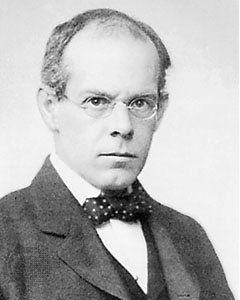James McKeen Cattell American Psychologist
Introduction
James McKeen Cattell American Psychologist is one of the most renowned psychologists who belonged to United States of America and it was due to his consistent efforts that the status of psychology in the United States advanced towards the “use of objective experimental methods, mental testing, and application of psychology to the fields of education, business, industry, and advertising” (“James McKeen Cattell”, 2013). Cattell has been successful in producing 2 professional directories and has also originated 5 scientific periodicals.
Brief Biography
Cattell was born in Easton, Pennsylvania on May 20, 1860. He was born in an educated family as his father was the head of Lafayette College (Easton). Cattell’s family gave him full support to acquire high education and therefore encouraged him to go abroad for studying and working. In 1880, he graduated from the Lafayette College and went to Germany for studying. There, he met Rudolf Hermann Lotze and Wilhelm Wundt, the two famous psychologists, at the University of Göttingen and at the University of Leipzig respectively (Hergenhahn & Henley, 2013). When he returned to the United States of America, he took admission in the Johns Hopkins University, Baltimore and spent two years there. Going back to Leipzig, Cattell started his career as the assistant of Wundt after which he started to carry out investigations intended for knowing about scientific neutrality/impartiality (“James McKeen Cattell”, 2013).
In 1886, Cattell was still at Leipzig and received his Ph.D. from there. Later, he went on with his research at Sir Francis Galton’s London laboratory (Hergenhahn & Henley, 2013). One of his biggest achievements is that he was awarded the professorship in psychology in 1888 which was the first one that was ever presented to anyone at the University of Pennsylvania, Philadelphia. It was at the same place that he was able to establish a laboratory of his own and prepared a number of mental measurement tests for the students who were studying at college (“James McKeen Cattell”, 2013).
Cattell then joined Columbia University in 1891 and was made the university lecturer and administrative head of psychology department there. A good number of his life years were spent there during which he improved and advanced his research on mental testing (Hergenhahn & Henley, 2013). He became the cofounder of the Psychological Review in 1894 and also got his hands on Science that was a weekly journal that Cattell edited from till 1944. He was also involved in the establishment of Popular Science Monthly in 1900. After fifteen years, the name was changed to Scientific Monthly. He was highly concerned regarding the scientific eminence and this interest directed him towards the origination, editing and publication of a professional directory known as American Men of Science. In 1917, Cattell openly criticized World War I draft and as a consequence, he had to suffer a dismissal from Columbia (“James McKeen Cattell”, 2013).
His professional life then continued a bit slowly whereby he involved himself in editing The American Naturalist and School and Society. He became the founder of the Psychological Corporation in 1921. The reason behind founding this corporation was simple as Cattell wanted to make research in applied psychology accessible to manufacturing and commercial sectors (“James McKeen Cattell”, 2013). On January 20, 1944, the great psychologist died in Lancaster, Pennsylvania (Hergenhahn & Henley, 2013).
Contributions to Psychology
James McKeen Cattell American Psychologist is considered as the pioneer of psychology in the United States of America due to whose influence, this field of science started using objective methods of study and the application of psychological methods became practically viable in more or less every area of life.
Psychology has been strongly and everlastingly impacted by Cattell in a number of ways. To begin with, Cattell’s career started in an era during which philosophy had a strong influence on psychology and other sciences related with human behavior. The alliance with philosophy had not made it possible for psychology to thrive as a separate field and this point encouraged Cattell to do something regarding making psychology a unique subject for further research (Schultz & Schultz, 2012).
Thus, Cattell was successful in supporting the idea that it is completely possible for psychology and related sciences related to behavior, biology and society to continue thorough, purposeful, scientific research. His impulsion speeded up this progress and the world witnessed a rapid change in procedural practices in the mentioned fields of science. According to a lot of researchers and historians, it was due to the constant efforts of Cattell that the United States of America experienced a hastened development in the behavioral, social and biological sciences. He may be considered as the only person who rendered his services in an absolute honest manner and no one can reach the point he was able to reach (Bourgoin & Byers, 1998).
Cattell was also able to show the scientific approach and its inflexibility in his own work when he was doing research on reading and observation (sensitivity), psychophysics, and the differences in individuals and the reaction times of individuals to a variety of stimuli. His research findings can be examined today as well which conclude “that eyes jump during reading, that words in print are only perceived when the eyes are at a standstill, that many words can be learned and remembered more easily and accurately than most letters, and that words and phrases can be read in a small fraction of a second” (Bourgoin & Byers, 1998).
Cattell was also successful in advocating the notion that scientific findings must be made use of in practical life. His findings and related analysis concerning reading and reaction time transfigured and modernized a number of educational practices. As already mentioned, the Psychological Corporation founded by Cattell in 1921 turned out as one of the most eminent and authentic institution for tests’ development to be used in educational and industrial sectors of the United States of America (Bourgoin & Byers, 1998).
Another major contribution of James McKeen Cattell American Psychologist in the field of Psychology is that he made a lasting impression in the history of America by rendering his services to specialized organizations and the publication of journals. Cattell was among the founding members of the renowned American Psychological Association (APA) and a number of other societies established for the sake of scientific research and development (Schultz & Schultz, 2012). He also originated and published a number of scientific journals like Science, Scientific Monthly and the American Naturalist. He was also the founder and publisher of the first and succeeding versions of American Men of Science and Leaders in Education (Bourgoin & Byers, 1998).
Human Intelligence Theory
Cattell truly represented the functionalist character of American psychology though he wasn’t a functionalist himself. He had a strong impact on the movement in the direction of a realistic, test-oriented and matter-of-fact approach to the mental processes as a distinctive subject. Cattell possessed a real concern for the human abilities and this is the reason why he researched on simple mental processes including naming objects and drugs; effects on mind etc. Cattell strongly encouraged the notion that psychology can be proved as a distinctive science by first focusing on the area of intelligence (Schultz & Schultz, 2012). According to him, the mental power itself could be divided into standardized measurement units. Thus, Cattell set on to develop certain measurement tools for the measurement of intelligence and was able to construct various mental testing instruments and also introduced psychophysical tests that were fifty in number including dynamometer pressure, sensation areas, least noticeable difference in weight, bisection of a 50cm line etc (Freedheim, 2003).
If Catell was asked to present his views regarding gay marriage, he would definitely have opposed the idea as he highly regarded the importance of the institution of marriage. He was against the idea of being unmarried but he would have definitely rejected gay marriage as he gave great reverence to the relationship between a man and his wife. There has been evidence that he was against the idea of birth control and he never practiced it. It is , therefore, crystal clear that if he were here in the contemporary times, Cattell would have definitely rejected the idea of gay marriage.
Conclusion
To cut a long story short, James McKeen Cattell is, without a doubt, an exceedingly influential figure in the history of American psychology as a coordinator, manager and overseer of psychological discipline and application. James McKeen Cattell American Psychologist also proved himself to be the major vocal connection between psychological research and studies and the superior scientific society.
It is one of his greatest achievements that even after a century, the publications and journals he originated back then are still around and are used by the contemporary scientists and psychologists for reference (Schultz & Schultz, 2012).
References
Bourgoin, S. M., & Byers, P. K. (1998). James McKeen Cattell. Encyclopedia of World Biography (p. 111). Detroit: Gale. Print.
Freedheim, D. K. (2003). Handbook of Psychology (Volume 1). Hoboken, NJ: Wiley. Print.
Hergenhahn, B. R., & Henley, T. B. (2013).Introduction to the History of Psychology. Stamford: Wadsworth. Print.
James McKeen Cattell. (2013). In Encyclopædia Britannica. Retrieved from http://mchoudini.montgomerycollege.edu:3259/EBchecked/topic/100070/James-McKeen-Cattell
Schultz, D. P., & Schultz, S. E. (2012). A History of Modern Psychology. Australia; Belmont, CA: Thomson/Wadsworth. Print.

